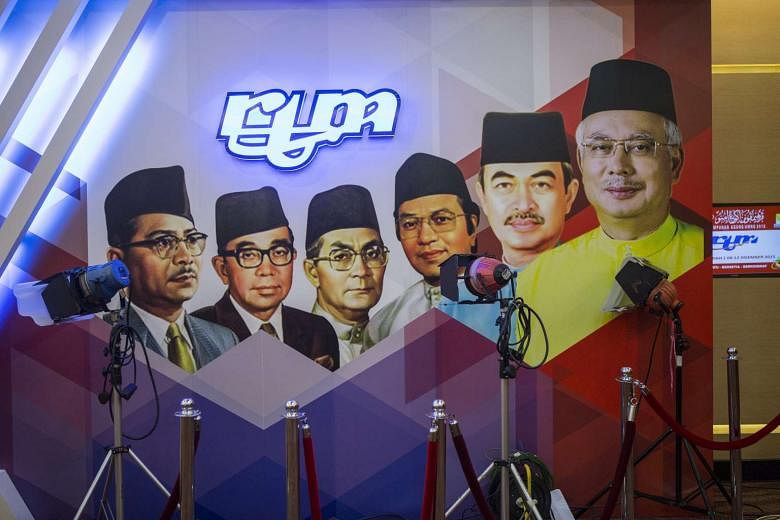Lim Sue Goan
Sin Chew Daily/ANN
The Umno General Assembly this week has become the focus of media attention.
This year, the assembly will be held in a rather strange and suppressed atmosphere and there are quite some aspects different from in the past years.
The first is the obvious departure from the party's tradition.
In the past, Umno's deputy president would officiate the assemblies of the party's three wings, and his speech would serve as the guidance for the Youth, Wanita and Puteri wings.
Even in 1986, when Mr Musa Hitam was not in good terms with former prime minister Mahathir Mohamed, the president never denied his deputy's right to speak at the general assembly.
Tan Sri Muhyiddin Yassin, unfortunately, has become the first deputy president to have been denied such a right.
Although Umno's constitution has not specified that the assemblies must be officiated by the deputy president, the tradition nevertheless has something to do with democratic rights.
For example, it has become a tradition that party delegates are allowed to criticise the leadership.
It will be undemocratic to restrict the debates of delegates.
Even Members of Parliament have the right to table a motion of no confidence against the prime minister, which the speaker must not block.
The tradition has evolved into a customary practice in a democratic society, and once this is discarded, it will look a little unusual, signs that democracy is being compromised.
Umno vice-president Hishammuddin Hussein said Umno's conditions now were not any worse than during the party's infighting.
That said, a difference in the nature of the crisis could have been the second unusual aspect in this year's general assembly.
Umno has seen several crises since its inception 69 years ago, from the founder Datuk Onn Jaafar to Tun Abdullah.
Mr Onn Jaafar's proposal to open the party to other races was met with strong objection, a crisis arising from ideological perception.
The Umno infighting in 1987 and the removal of Anwar Ibrahim in 1998, both during Tun Mahathir's time, were largely triggered by factional clashes.
Datuk Seri Najib is currently commanding full control of the Supreme Council and divisions, and no one has the ability to challenge his dominance.
However, the current crisis has been derived mostly from the controversial RM2.6 billion (S$856 million) political donation as well as 1Malaysia Development Berhad's (1MDB's) RM42 billion in debts.
During the 1990s, a grassroots leader was sacked for spending RM6 million to "buy" a divisional chairman's post.
For so many years, the party has been trying very hard to draw a line between itself and money politics.
The crisis today could be the first sparked by money politics.
The third oddity of this year's event is the unprecedented alienation encountered by the Umno leadership.
Some government institutions have expressed their firm attitude over the two above-mentioned issues.
Meanwhile, the Conference of Rulers has on Oct 6 issued a statement to ask the government to complete the 1MDB investigation as soon as possible and take stern actions against those involved.
Dr Mahathir successfully united the party again and won the general elections after the 1987 crisis.
But, can Mr Najib mend the crack within the party and keep the administration intact?
Strangely, all the powers seem to come in the hands of the party president alone.
For the first time ever, Umno is facing a powerful backlash from the pubic, thanks to the Internet.
The Conference of Rulers' stand is also governing widespread attention, especially with regard to the hastily adopted National Security Council Bill 2015.
Recent remarks by Dr Mahathir might indicate the former PM's "remorse".
He said no political parties should rule forever in a democratic country and that a two-party system is the best manifestation of democracy. His regret might have come a little too late.
If not because he kept instilling the ideas of "Malay dilemma" and "ketuanan Melayu", and kept changing the laws and systems to allow Umno leaders to command absolute power, Dr Mahathir might not even find himself in such a dilemma today.
Now the party leadership intends to tie the destiny of Umno to the future of the Malays, allowing the party to continue holding on to power with the support of rural voters.
If the voters are willing to accept this, then Umno will be able to sail past the current crisis rather incident-free. Nevertheless, the latest poll shows that Umno's support rate among the Malays has fallen to a mere 31 per cent.
Meanwhile, grassroots leaders are sitting on the same boat and there is no way for them to abandon the ship.
The problem is: They do not have the courage to adopt other solutions to reverse the current dilemma.
Umno has been able to run the country for more than half a century mainly through the Barisan Nasional (BN) model and timely adjustments.
People are getting increasingly skeptical now that the BN model becomes precariously shaky and the party tradition is intentionally abandoned, sending the party to its most trying times since its formation.

